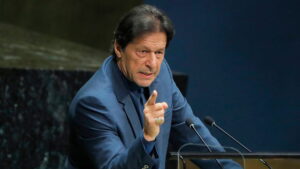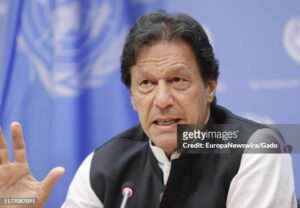Imran khan
Imran Khan is a Pakistani politician, former international cricketer, and the Prime Minister of Pakistan. Pakistan. Imran Khan gained international fame as a cricketer, leading the Pakistan national cricket team to victory in the 1992 Cricket World Cup.
Imran Khan transitioned into politics and founded the political party Pakistan Tehreek-e-Insaf (PTI) in 1996. Over the years, he became a prominent political figure in Pakistan. Imran Khan became the Prime Minister of Pakistan after his party won the general elections in July 201
imran khan marrige life..
Imran Khan has been married multiple times. His first marriage was to Jemima Goldsmith, a British socialite, and the marriage took place in 1995. The couple had two sons, Suleiman Khan and Qasim Khan.
Imran Khan then married Reham Khan, a Pakistani journalist, in 2015, but this marriage also ended in divorce after a short period.
In February 2018, Imran Khan married his third wife, Bushra Bibi (also known as Bushra Maneka). She was previously married and has children from her previous marriage. Bushra Bibi is known for her involvement in spiritual and religious activities.
It’s important to note that information regarding personal lives, including marriages, can change, and there may have been developments or changes since my last knowledge update in January 2022. It’s recommended to check the latest sources for the most up-to-date information on Imran Khan’s personal life.
imran khan politic career
Imran Khan has been actively involved in politics for several years. He transitioned from a successful cricket career to politics, founding the political party Pakistan Tehreek-e-Insaf (PTI) in 1996. Imran Khan’s political journey involved multiple general elections, with the PTI gradually gaining support over the years.
One of the significant milestones in his political career came in the 2018 general elections when the Pakistan Tehreek-e-Insaf emerged as the single largest party, securing enough seats to form a government. Imran Khan was elected as the Prime Minister of Pakistan and took the oath of office on August 18, 2018.
During his tenure as Prime Minister, Imran Khan focused on various policy initiatives and reforms, including efforts to address economic challenges, improve governance, and combat corruption. His government faced both internal and external challenges, and his leadership decisions garnered diverse reactions.

Please note that political situations can evolve, and there may have been developments in Imran Khan’s political career since my last update in January 2022. For the latest information on Imran Khan’s political activities and his time as Prime Minister, it is recommended to check current news sources or official statements.
After his withdrawal from justice, Khan came an open critic of government mismanagement and corruption in Pakistan. He innovated his own political party, Pakistan Tehreek-e-Insaf( Pakistan Justice Movement; PTI), in 1996. In public choices held the ensuing time, the recently formed party won lower than 1 percent of the vote and failed to win any seats in the National Assembly, but it fared slightly better in the 2002 choices, winning a single seat that Khan filled. Khan maintained that vote apparel was to condemn for his party’s low vote summations. In October 2007 Khan was among a group of politicians who abnegated from the National Assembly, protestingPres. Pervez Musharraf’s training in the forthcoming presidential election. In November Khan was compactly locked during a crackdown against critics of Musharraf, who had declared a state of exigency. The PTI condemned the state of exigency, which ended inmid-December, and transacted the 2008 public choices to protest Musharraf’s rule.
In malignancy of the PTI’s struggles in choices, Khan’s populist positions set up support, especially among youthful people. He continued his review of corruption and profitable inequality in Pakistan and opposed the Pakistani government’s cooperation with the United States in fighting zealots near the Afghan border. He also launched gushes against Pakistan’s political and profitable elites, whom he indicted of being Westernized and out of touch with Pakistan’s religious and artistic morals..
Political ascent
In the months leading up to the legislative choices listed for early 2013, Khan and his party drew large crowds at rallies and attracted the support of several expert politicians from Pakistan’s established parties. farther substantiation of Khan’s rising political fortunes came in the form of an opinion bean in 2012 that set up him to be the most popular political figure in Pakistan.
Just days before legislative choices in May 2013, Khan injured his head and back when he fell from a platform at a crusade rally. He appeared on TV from his sanitarium bed hours latterly to make a final appeal to choosers. The choices produced the PTI’s loftiest summations yet, but the party still won lower than half the number of seats won by the Pakistan Muslim League – Nawaz( PML- N), led by Nawaz Sharif. Khan indicted the PML- N of apparel the choices. After his calls for an disquisition went unmet, he and other opposition leaders led four months of demurrers in late 2014 in order to press Sharif to step down.
The demurrers failed to oust Sharif, but reservations of corruption were amplified when the Panama Papers linked his family to coastal effects. Khan organized a new set of demurrers in late 2016 but called them off at the last nanosecond after the Supreme Court agreed to open an disquisition. The disquisition disqualified Sharif from holding public office in 2017, and he was forced to abdicate from office. Khan, meanwhile, was also revealed to have had coastal effects but, in a separate case, wasn’t disqualified by the Supreme Court.
choices were held the ensuing time, in July 2018. Khan ran on a platform of fighting corruption and poverty, indeed as he’d to fight off allegations that he was too cozy with the military establishment. The PTI won a plurality of seats in the National Assembly, allowing Khan to seek a coalition with independent members of the congress. He came high minister on August 18..
Founding and political orientation
he PTI was innovated to address dissatisfaction among Pakistan’s primary ruling realities, including the Pakistan Muslim League- Nawaz( PML- N), the Pakistan People’s Party( PPP), and the fortified forces. Khan, who had retired from justice in 1992 at the height of his celebrity, was deeply affected by the red tape recording involved in pursuing his humanitarian sweats, including the regulatory difficulty he encountered in opening a sanitarium for cancer cases in 1994. As the country came decreasingly concentrated amid a public reproach involving Prime Minister Benazir Bhutto’s family, Khan innovated the party on April 25, 1996. Just days before the sanctioned advertisement of the party’s launch, his sanitarium for cancer cases was the target of a bombing.
The party was populist in nature while condemning government corruption, it aimed to ameliorate the standard of living across Pakistan and called for adding the rights of women and religious nonages. But it didn’t inescapably gain traction from the grassroots. In numerous ways, the party served as a political vehicle for Khan, and from the time of its launch it was vague on how it aimed to achieve the nebulous pretensions outlined in its platform. The party had nearly no following in the first decade of its actuality. Indeed, it gained only one seat in the National Assembly in 2002, and that was enthralled by Khan himself.

Rise to prominence
From 1999 to 2008 Pakistan was under the authority of Pervez Musharraf, a military officer who had taken power in a coup.1999 to 2008 Pakistan was under the authority of Pervez Musharraf, a military officer who had taken power in a achievement. While the PTI had little support before the achievement, matters bettered for the party after the country returned to mercenary rule and electoral competition was restored. By the end of Musharraf’s administration, the modes of communication( and political association) were radically transubstantiating as mobile telephones came commonplace and offered wide access to the Internet. The PTI successfully mustered support through social media juggernauts, and in October 2011 it organized its first mass rally( jalsa), in Lahore, Pakistan’s largest megacity.
While the party had preliminarily concentrated on issues of structure and justice, it now took a more oral station against Pakistan’s reliance on foreign actors. Its rhetoric resounded especially after times of military rule during which theU.S.- led Afghanistan War( 2001 – 14) had had an outsized impact on policy in the country. also, the party’s nuanced approach to dealing with the Afghan Taliban garnered support from the country’s Pashtuns, who had been disproportionately affected by military exertion along the northern borders.
By the time general choices were held in 2013, Khan had come one of the most popular political numbers in Pakistan and had signed the support of several expert politicians. In addition to winning a sprinkle of seats in the National Assembly, the PTI won a maturity of the legislative seats in the generally Pashtun fiefdom of Khyber Pakhtunkhwa and was suitable to form a government there..
The pTI gained a character for reform in Khyber Pakhtunkhwa indeed as the central government, under the premiership of the bogged Nawaz Sharif, came mired in reproach. The PTI’s programs in Khyber Pakhtunkhwa had bettered responsibility in the fiefdom by adding translucency and giving citizens lesser access to legal expedient. Medical services and public education had also bettered under the party’s term. By discrepancy, Sharif was linked in 2016 to shell companies abroad, and in 2017 he was disqualified by Pakistan’s Supreme Court from holding public office. Although Khan was also set up to be holding means abroad — after veritably intimately promising to “ keep all my wealth in Pakistan ” — he wasn’t disqualified, and the PTI swept to power in 2018 amid a surge of antiestablishment sentiment.
Government of Imran Khan
The PTI government, in power from August 2018 to April 2022 under Khan’s premiership, faced redoubtable domestic challenges. It inherited a balance- of- payments extremity, prodded by enormous debt commitments, similar as those assessed by the China- Pakistan Economic Corridor( CPEC) action. The COVID- 19 epidemic, which began in early 2020, added to the fiscal stress as the PTI remained reluctant to apply lockdowns and soaring infections placed tremendous strain on the health care system. Meanwhile, after India launched a brief air assault on Pakistan in February 2019 over the latter’s alleged provision of safe havens for zealots seeking to end Indian administration in corridor of Kashmir, Khan stirred contestation by carrying out a crackdown on suspected zealots and closing religious seminaries for contended indoctrination.
Khan tried to reorient Pakistan’s foreign policy. He tried to court foreign aid and investment from an decreasingly wide range of countries and under favourable conditions, hoping to reduce Pakistan’s reliance on any particular foreign reality. Meanwhile, he came an arbitrator between the Taliban and the United States, which helped bring about the 2021 pullout ofU.S. colors from Afghanistan as well as advanced relations between Pakistan and the Taliban. Controversially, just hours after Russia raided Ukraine in February 2022, Khan attended a long- planned meeting with RussianPres. Vladimir Putin as much of the world was seeking to insulate the scrappy leader.
Pakistan’s ailing frugality and the government’s crackdown on zealots concentrated the PTI’s sympathizers and critics, while the government’s attempt to steer foreign policy singly of the country’s fortified forces unsettled its relationship with the military establishment. To make matters worse for the party, in October 2021 Khan tried to impact the appointment of the chief of Pakistan’sInter-Service Intelligence( ISI) directorate, supersizing fresh enmity from the fortified forces. On April 10 he was removed from office after a sprinkle of Assembly members from the PTI refused to bounce in his favour.
Crackdown on the PTI
Crackdown on the PTi Pakistan remained polarized indeed after the opposition took the arm. In July — only months after Khan had been ousted from the premiership — the PTI won utmost of the queried seats in an election in Punjab, the country’s largest fiefdom and traditionally a fort for the ruling PML- N party. As the PTI gained renewed instigation, still, Khan began facing a slew of legal challenges. In October he was barred from holding public office for several times after the election commission set up that he vended state gifts and concealed means while high minister. In November, as feelings in the country mounted, he was shot in the leg in an assassination attempt.
Khan constantly asserted that a military officer was responsible for November’s assassination attempt, an blameworthiness that the military intimately dismissed as “ largely reckless and unwarranted ” on May 8 As Khan appeared for court sounds in Islamabad on May 9, he was taken into guardianship by dozens of civil officers for lack of cooperation in ongoing corruption examinations. The dramatic arrest urged demonstrations and violence directed toward service installations and government structures by Khan’s sympathizers. The PTI was latterly subordinated to a crackdown, media content and Internet access were temporarily confined, and dozens of prominent members of the party defected.

faqs
imran Khan is a Pakistani politician and former international cricketer.
2. What is Imran Khan’s political party?
Imran Khan is the founder of the political party Pakistan Tehreek-e-Insaf (PTI), which he established in 1996.
3. When did Imran Khan become the Prime Minister of Pakistan?
Imran Khan became the Prime Minister of Pakistan after his party, PTI, won the general ections held in July 2018. He took the oath of office on August 18, 2018.
4 How many times has Imran Khan been married?
Imran Khan has been married three times. His first marriage was with Jemima Goldsmith, his second with Reham Khan, and his third with Bushra Bibi.
